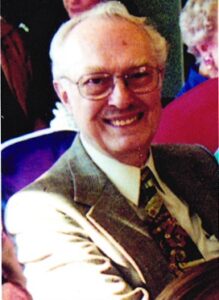One day 35 years ago, Jim Gilmore decided he had had enough.
He had spent 43 years at The Republic — tightening, correcting, polishing and improving the articles that crossed his desk, selecting content and designing pages that grabbed the readers’ attention.
Now he was fed up; not with the work he did so expertly, but with the never-ending parade of “technological improvements” that continued to come at him like water out of a firehose.
Work had become a continuous flood of changing computer systems that were supposed to do what they didn’t do; new production processes that might one day be a great improvement but initially just caused delays and ulcers.
Jim was only 59 and far from financially secure, but that day in 1987, he just stood up and walked out.
On the way to the door, he stopped at the desk of Sheila Snively, a co-worker and friend, and handed her an envelope. Inside was an obituary he had written for himself. He asked her to keep it in her drawer to use at some appropriate time.
Sheila recalled that envelope Wednesday when she opened that day’s newspaper and found an obituary about Jim — not the one she had kept in her drawer all these years, but a four-paragraph death notice provided by Barkes, Weaver and Glick Funeral Home. Jim had no known living relatives and the information had come from a subsidiary of the Thrive Alliance, which had been appointed his legal guardian by the courts.

Sheila was one of the few employees still at The Republic who had worked with Jim, or even had any idea who he was. By that time, I had read the death notice and had called Editor Julie McClure to volunteer to write a column about him.
A few minutes later, Julie texted me to say Sheila had given her the obit Jim had written as he left.
The obituary was brief:
“James (NO INITIAL) Gilmore
“Born October 7, 1927, in Columbus to B.C. and Dorothy M. Gilmore. Graduated in May, 1944, from Columbus High School and a week later joined the editorial staff of The Evening Republican, forerunner of The Republic. Retired in 1987 as copy desk chief.
“(He didn’t “enjoy” sports or fishing or politics or anything else anyone would be interested in knowing about and he wasn’t an “avid” anything.)
“Preceded in death by parents and a sister, Virginia E. Gilmore. No immediate survivors.
“Cremation: no calling hours or funeral service (and no burial at Garland Brook Cemetery!)”
But, sorry Jim, as much as you never liked being in the spotlight, your obit was not your best work — not much better than the one from the funeral home. The truth is, you were the best copy chief in the history of The Republic and its predecessor.
You could be cantankerous. You sometimes got angry enough at stupid, repeated errors from reporters that you would unleash your sharp tongue and cut their egos in half. Still, you were the best.
Let me set the record straight — something you always encouraged the staff to do when journalism fell short.
Jim joined the staff of The Evening Republican (former name of The Republic) in 1944, the summer after he graduated from Columbus High School at the age of 16. Jim had been editor of The Triangle newspaper at CHS his senior year and one of his co-workers was Jane Lostutter, daughter of Mel Lostutter, editor of The Evening Republican.
Jane talked her dad into inviting Jim over to their house for an interview. Mel — who also was a novelist and later a professor of journalism at Michigan State University — talked with Jim for more than two hours. At the end of the talk, Jim was hired at a salary of $12 a week.
Jim’s first job at the newspaper was writing news of local men serving in World War II. Soon, however, his abilities as a wordsmith became obvious and he was moved to the copy desk to edit the writings of other staff members.
He also began to write feature stories, and by the late 1940s was producing his own weekly column, “Radio-Active,” which provided commentary on radio programs and later on television shows — particularly those involving the classical music and opera performances he loved all his life.
His writing caught the attention of WCSI radio managers, who hired him part time as host of a two-hour broadcast of opera and classical music each Sunday afternoon.
At The Evening Republican, Jim was named copy editor and then promoted to several other titles, but his primary duties remained doing what he did best — editing and correcting the writings of reporters, writing headlines and designing pages. In that job, he was an expert, a teacher and a mentor to many would-be journalists (including an intern named Bud Herron who joined the staff in the summer of 1964).
Not financially able to attend college, Jim educated himself. He was a voracious reader. He became an expert in art and classical music history. And he taught himself several languages.
Through it all, he cared for his mother and his sister, who was born with disabilities that required her to be institutionalized, although she returned home for weekend visits from time to time. He cared for his mother in the family home on Cottage Avenue where he was born until her death in 1994 at the age of 103.
During the time in the early 1970s when I returned to Columbus as news editor, our desks were next to each other, and while we weren’t in the throes of deadlines, we got to know each other and became close friends.
My wife, Ann, and I invited him to dinner and he reciprocated by cooking a gourmet meal for us at his cabin in Brown County.
But Jim also was emotionally mercurial and had insecurities that often created problems with maintaining the friendship. I left The Republic in 1974 for a six-year stint at a Dallas, Texas, newspaper. When I returned, our close friendship never quite recovered, although I would always stop and talk to him when I had meetings at The Republic.
The last time I talked to Jim was at the retirement reception in 2014 for Harry McCawley, The Republic’s associate editor and columnist.
Jim was all smiles and shook with laughter as I roasted Harry from the stage at The Commons. Dressed with his usual flair in a green sport coat and a flowered, silk shirt, Jim looked like the same man of style, culture and intelligence I had known for so many years.
Still, in our private talk, he told me his health was failing.
Several times after that I tried to get in touch with him, but the phone number I had was not valid. Time passed.
About five years ago, I woke up one morning with Jim on my mind and drove over to his home on Cottage Avenue to see if he was there. No one answered the door. The bushes outside his porch were overgrown and the house was dark.
I called a few people I thought might know where he had gone, but no one knew anything about him. Finally I heard he was in a nursing home in Hope. I called and was told he had been there a few weeks but had gone home to be cared for by a neighbor.
I drove back to the house, but no one answered the door and all was dark inside as I peered though broken blinds on a front window. I assumed he was in another nursing home somewhere and gave up my search.
Then came the July 13 obituary.
The rest of the morning I was on the phone, trying to piece together Jim’s final days. Eventually I was able to sort out details from the funeral home and a staff member at the Volunteer Advocates for Seniors or Incapacitated Adults, a part of the local Thrive Alliance. The story was heartbreaking.
Jim was nearly bedridden and was unable to care for himself. Then a neighbor volunteered to help. She told him he needed to sign over power of attorney to her and make her his legal guardian if she were to care for him. Then, according to VASIA supervisor Lori Bland, the neighbor-turned-guardian placed him in a nursing home on Medicaid and moved into his house.
When VASIA staff investigated the situation based on a tip, they discovered Jim’s bank account had been drained and belongings at his house had been removed or sold.
At that point, VASIA went to court and successfully transferred legal guardianship to their not-for-profit organization. The agency continues to look into the possibility of criminal charges against the former guardian.
“I wish I had known him,” Bland told me the day the obituary ran in the newspaper. “I could tell he was a very special person from the piles of personal papers piled around the home. He had stacks of clippings from his writings. And there were books stacked everywhere. He obviously was a very intelligent man. He must have been a very special person.”
And that he was.
“James (NO INITIAL) Gilmore” was a very special man indeed.





